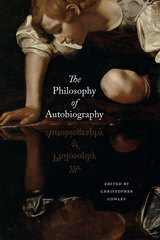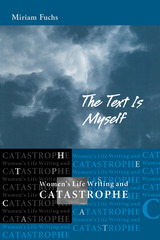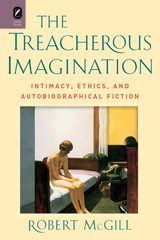3 books about Autobiographical fiction

The Philosophy of Autobiography
Edited by Christopher Cowley
University of Chicago Press, 2015
We are living through a boom in autobiographical writing. Every half-famous celebrity, every politician, every sports hero—even the non-famous, nowadays, pour out pages and pages, Facebook post after Facebook post, about themselves. Literary theorists have noticed, as the genres of “creative nonfiction” and “life writing” have found their purchase in the academy. And of course psychologists have long been interested in self-disclosure. But where have the philosophers been? With this volume, Christopher Cowley brings them into the conversation.
Cowley and his contributors show that while philosophers have seemed uninterested in autobiography, they have actually long been preoccupied with many of its conceptual elements, issues such as the nature of the self, the problems of interpretation and understanding, the paradoxes of self-deception, and the meaning and narrative structure of human life. But rarely have philosophers brought these together into an overarching question about what it means to tell one’s life story or understand another’s. Tackling these questions, the contributors explore the relationship between autobiography and literature; between story-telling, knowledge, and agency; and between the past and the present, along the way engaging such issues as autobiographical ethics and the duty of writing. The result bridges long-standing debates and illuminates fascinating new philosophical and literary issues.
Cowley and his contributors show that while philosophers have seemed uninterested in autobiography, they have actually long been preoccupied with many of its conceptual elements, issues such as the nature of the self, the problems of interpretation and understanding, the paradoxes of self-deception, and the meaning and narrative structure of human life. But rarely have philosophers brought these together into an overarching question about what it means to tell one’s life story or understand another’s. Tackling these questions, the contributors explore the relationship between autobiography and literature; between story-telling, knowledge, and agency; and between the past and the present, along the way engaging such issues as autobiographical ethics and the duty of writing. The result bridges long-standing debates and illuminates fascinating new philosophical and literary issues.
[more]

The Text is Myself
Women's Life Writing and Catastrophe
Miriam Fuchs
University of Wisconsin Press, 2004
Queen Lili‘uokalani, the last monarch of Hawai‘i, was forced to abdicate and faced the annexation of her homeland. American poet H.D. wrote through the London blitz and during the years of less regular bombing. Italian novelist and art critic Anna Banti lost the manuscript of her novel about Artemisia Gentileschi but survived the war devastation to Florence to rewrite it. German-Jewish novelist Grete Weil fled to Holland, but her husband was arrested there and murdered by the Nazis. Chilean novelist Isabel Allende fled her country after her uncle Salvador Allende was assassinated and she later lost her daughter to disease.
In The Text Is Myself, Miriam Fuchs analyzes the impact of catastrophe on the lives and writings of these five women. She shows that, however much the past may be shaped into a discernible storyline, it is the uncertain present that preoccupies these writers. Using a feminist and comparative approach to the texts, Fuchs links the women in creative and insightful ways and displays their many profound connections, despite the differences in their cultural and geographic backgrounds.
Fuchs argues convincingly for a new genre within life writing—the narrative of catastrophe, defined by the writing process that occurs during catastrophic events. Two narratives are being told, and two levels of representation, literal and figurative, are present.
In The Text Is Myself, Miriam Fuchs analyzes the impact of catastrophe on the lives and writings of these five women. She shows that, however much the past may be shaped into a discernible storyline, it is the uncertain present that preoccupies these writers. Using a feminist and comparative approach to the texts, Fuchs links the women in creative and insightful ways and displays their many profound connections, despite the differences in their cultural and geographic backgrounds.
Fuchs argues convincingly for a new genre within life writing—the narrative of catastrophe, defined by the writing process that occurs during catastrophic events. Two narratives are being told, and two levels of representation, literal and figurative, are present.
[more]

The Treacherous Imagination
Intimacy, Ethics, and Autobiographical Fiction
Robert McGill
The Ohio State University Press, 2013
Many authors have been accused of betraying their loved ones by turning them into fictional characters. In The Treacherous Imagination, Robert McGill examines the ethics of writing such stories. He argues that while fiction has long appealed to readers with its narratives of private life, contemporary autobiographical fiction channels a widespread ambivalence about the value of telling all in a confessional age—an age in which fiction has an unprecedented power to leave people feeling libeled or exposed when they recognize themselves in it.
Observing that the interests of authors and their loved ones in such cases are often less divergent than they appear, McGill assess strategies by which both parties might use fiction not to hurt each other but to revise and revitalize intimacy. Discussing authors such as Philip Roth, Alice Munro, A. S. Byatt, and Hanif Kureishi, McGill questions whether people should always require exclusivity of each other with regard to the stories they tell about private life. Instead, authors and their intimates might jointly embrace fiction’s playful, transgressive qualities, even while reexamining the significance of that fiction’s intimations.
In treating autobiographical fiction as both a willful public indiscretion and a mediator of intimate relations, The Treacherous Imagination provides a comprehensive account of the various potentials that fiction holds to harm and to help those who write it, those who read it, and those who see themselves in it.
[more]
READERS
Browse our collection.
PUBLISHERS
See BiblioVault's publisher services.
STUDENT SERVICES
Files for college accessibility offices.
UChicago Accessibility Resources
home | accessibility | search | about | contact us
BiblioVault ® 2001 - 2024
The University of Chicago Press









